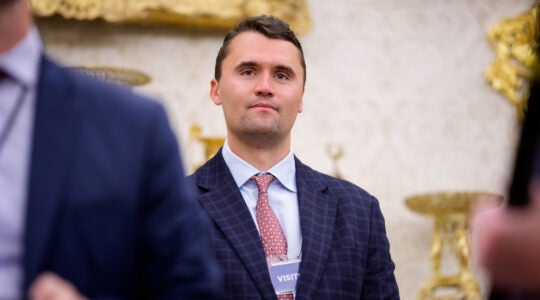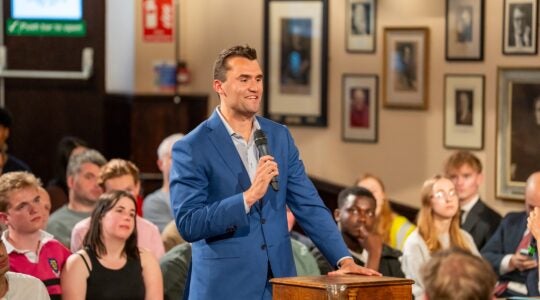NEW YORK (JTA) – Organizers of next week’s convention of Conservative rabbis in Washington acknowledge they have had trouble keeping the roster of speakers balanced between left- and right-wingers.
In theory, to beef up the underrepresented liberal side, they could have turned to U.S. Supreme Court Justice Stephen Breyer or Democratic National Committee Chairman Howard Dean.
But under a little-known policy, neither would be permitted to speak at the annual gathering of the Conservative movement’s Rabbinical Assembly Feb. 10-14.
“The policy is we will only invite speakers who are either single or, if they are married, are not intermarried,” said Rabbi Joel Meyers, the R.A.’s executive vice president.
Meyers confirmed that the prohibition even extends to the non-Jewish spouses of Jews – so scratch Dean, not to mention U.S Senate Majority Leader Harry Reid (D-Nev.), whose Jewish wife converted to Mormonism.
“It’s a longstanding policy because the R.A. publicly is really in favor of inmarriage, it’s in favor of endogamy, very strongly so,” Meyers said. “While clearly it supports outreach efforts, and it’s welcoming of intermarried couples into the community, as a public statement of its position it wants to maintain the position that it has always maintained.”
Along with homosexuality, intermarriage is an issue that has long bedeviled the leaders of the Conservative movement, presenting them a seemingly stark choice between preserving tradition and adjusting to contemporary realities – two poles the movement has historically prided itself on bridging.
“It’s a difficult subject which is treated very seriously, and it’s held in a complex tension,” Meyers said. “We’re able to hold tradition in tension with modernity.”
But while the movement’s authorities on Jewish law have taken a bold and controversial step on homosexuality, ruling in 2006 that it was permissible to ordain gay rabbis and consecrate same-sex unions, the official view of intermarriage remains as it has always been. Among the few things that R.A. members are expressly prohibited from doing are attending or performing intermarriages.
Still, in recent years, some Conservative rabbis have been pushing for a more tolerant and flexible approach to accommodating intermarried couples while still upholding the intermarriage ban.
A recently established outreach committee is examining best practices on welcoming intermarried couples within the movement’s synagogues. And Rabbi Jeffrey Wohlberg, the R.A’s incoming president, told JTA that the organization will reconsider the speaker policy.
For now, however, it is in force. Sources familiar with the planning process said that Breyer’s name was floated as a possible speaker but rejected in part because he is intermarried.
Some movement rabbis criticized the policy and said it lacked support.
“I don’t think anybody thinks very much of this policy,” said Rabbi Charles Simon, executive director of the Federation of Jewish Men’s Clubs, who told JTA he was confident that it would soon be reversed.
The R.A.’s policy on intermarried speakers is not well known, even among some veteran members of the assembly. Several only learned of it through JTA’s inquiries.
But while many sympathized with the R.A.’s desire to promote inmarriage, some rabbis felt the policy does more harm than good.
“It’s the right priority,” said Rabbi Bradley Artson, dean of the Ziegler rabbinical school in Los Angeles, “but the policy isn’t the right policy for the goal.”
Rabbi Jill Jacobs, a social activist who has pressed the movement on workers’ rights issues, noted that the convention’s speakers skewed toward the conservative side of the political spectrum, yet no one feared that the assembly was endorsing a conservative viewpoint.
“It seems strange that on this one issue there would be a concern that somebody would see intermarried speakers invited to the R.A. as the R.A. actually endorsing intermarriage,” Jacobs said. “I think the R.A. is clear enough on this point to avoid any confusion.”
JTA has documented Jewish history in real-time for over a century. Keep our journalism strong by joining us in supporting independent, award-winning reporting.





